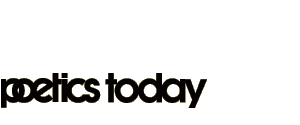 Contributions are being sought for a proposed special issue of Poetics Today on "Narrative Theory and the History of the Novel", to be guest-edited by Paul Dawson. Interested parties should submit a 300-word abstract to paul.dawson@unsw.edu by November 30th, 2015. A prospectus and list of potential contributors for the proposed issue will then be subject to peer review, and approval by the journal editor, Brian McHale. Submissions should be guided by, but not limited to, the following rationale and parameters:
Contributions are being sought for a proposed special issue of Poetics Today on "Narrative Theory and the History of the Novel", to be guest-edited by Paul Dawson. Interested parties should submit a 300-word abstract to paul.dawson@unsw.edu by November 30th, 2015. A prospectus and list of potential contributors for the proposed issue will then be subject to peer review, and approval by the journal editor, Brian McHale. Submissions should be guided by, but not limited to, the following rationale and parameters:
The genre of the novel continues to be a contested formal and historical category. There remains no consensus on when it emerged as a distinct form, with persistent views of the novel as a product of the specific socio-cultural conditions of eighteenth-century England existing in tension with claims that it must be seen as a global phenomenon stretching back to antiquity. Much of this debate rests upon the problem of defining the novel itself. If novel studies has been concerned with the historical development of the genre, narrative theory has sought to anatomize its constituent features. In determining what distinguishes the novel from other narrative and literary genres, both fictional and nonfictional, answers have been sought in its formal properties and, more recently, in the specific affective responses it elicits.
While narrative theory can often be preoccupied with abstract taxonomic questions, novel studies tends to be limited in its attention to literary form. This proposed special issue of Poetics Today seeks to bring the poetics of narrative theory and the historical investigations of novel studies into closer dialogue to interrogate and extend the most pressing concerns of current scholarship. In particular, it seeks contributions that will investigate methodological links between historiographic, formalist and interpretive criticism of the novel. Below are some of the issues that could be considered:
-Much contemporary narrative theory draws upon the cognitive sciences and neurobiological research to test the capacity of narrative fiction to generate empathy in its readers. Recent scholarship in novel studies, on the other hand, draws upon the history of emotions – from Adam Smith's moral philosophy to the psychology of James Sully – to chart the influence of theories of the sympathetic imagination on the emergence and development of the novel. Can interaction between these two fields of research help investigate the ethical differences between sympathy and empathy and locate these differences in an historical context?
-In the wake of influential work by Catherine Gallagher and Michael McKeon, novel studies has sought to correlate realism with a discourse of fictionality that lays the foundation for the novel as a mode of nonreferential truth distinct from previous genres such as the romance. Narrative theory on the other hand, has predominantly approached the paradox of fictional truth by identifying signposts of fictionality or theorizing the construction of fictional worlds. In what ways can these narratological approaches be brought to bear on the history of fiction?
-The question of character is vitally related to the above two issues. While classical narratology can be said to have devoted less attention to character as a category in its own right, the anatomization of features such as free indirect discourse, along with the more recent focus on empathy and 'mind-oriented' approaches to narrative, represent points of convergence with contemporary novel studies. Gallagher's theory of character as the key mode of non-referentiality in the novel, and Alex Woloch's work on minor characters afford potential areas of research for further overlap.
-A significant emergent field in narrative theory is 'diachronic narratology': an attempt to historicize the formal elements of narrative fiction (such as voice and various modes of thought representation) by tracing a genealogy of these elements across periods. In what ways can such a project be informed by the more socio-cultural emphasis of novel studies, and what effect would this have on the periodizing tendencies of academic specializations which demarcate the 18th century novel, the Victorian novel, the Modernist novel, etc.
-What is the value of the digital humanities to a more comprehensive understanding of the novel? Quantitative approaches to literary history are best known via Franco Moretti's polemical claim for "distant reading". Within narrative theory, computational narratology has emerged as a potential means for realizing earlier structuralist aspirations for a universal grammar of narrative. Can these research programs be aligned and employed to supplement existing interpretive practices?